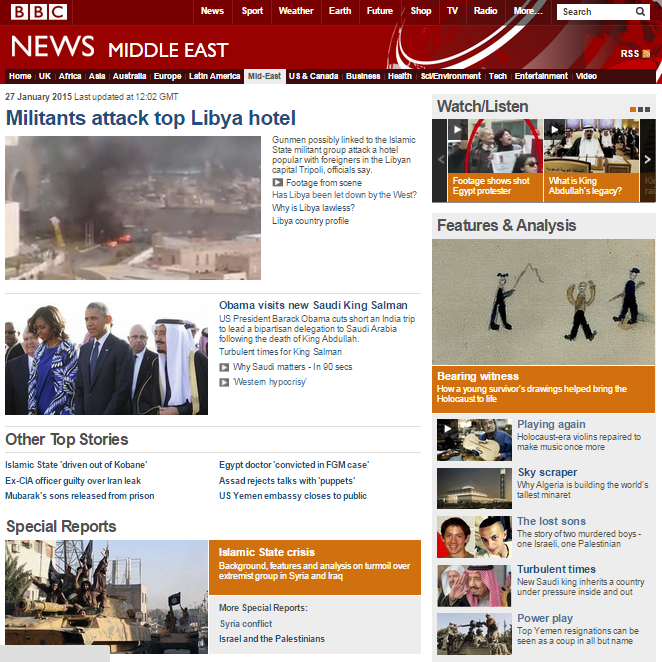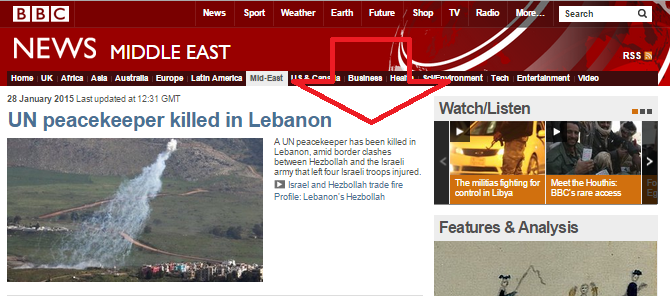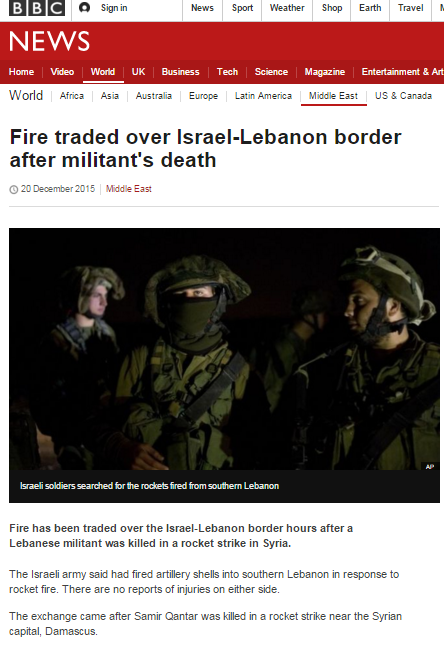Just before 1 p.m. on January 27th incoming missiles from Syria triggered air-raid sirens in the northern Golan Heights. Local residents took cover in their air-raid shelters and over a thousand visitors to the Mount Hermon ski resort had to be quickly evacuated. At least two projectiles were determined to have landed in Israeli territory and the IDF responded with artillery fire directed at the launch site in Syria and later on in the evening with strikes on Syrian army artillery posts. Both Israeli and foreign sources attributed the missile fire to Hizballah acting from Syrian army positions.
Despite at least one of its journalists in the region being aware of the incident, the BBC News website elected not to report those events at the time.
A day later – Wednesday, January 28th – an additional incident took place when Hizballah conducted a cross-border attack in the Har Dov area, firing anti-tank missiles at Israeli army vehicles. Mortars were also fired at an IDF position on Mount Hermon and reportedly at the village of Ghajar. Two soldiers were killed and seven wounded. Israel responded with artillery and air strikes.
In the BBC News website’s report on those events – originally headlined “Israeli soldiers wounded in Lebanon border attack” and later retitled “Israel fires into Lebanon after attack on troops”, followed by “Israel fires shells into Lebanon after attack on troops” and then “UN peacekeeper killed after Hezbollah-Israel clash” – the previous day’s events were described in one sentence.
“The incident came just hours after Israel launched an air strike on Syrian army positions near the Golan Heights in retaliation for rockets that were fired into Israel on Monday.”
In fact, the missiles were fired on Tuesday (January 27th) and readers obviously would not understand from this description that Hizballah was responsible for that attack as well, meaning that their ability to put the attack which is the subject matter of the report into its correct context would be impaired.
Also notable was the change in description of the incident on the BBC News website Middle East homepage. Initial reports portrayed events in the order in which they had happened – albeit without mentioning Hizballah.
As the day went on, that description was altered and became less clear as terms such as “border clashes” and “trade fire” were employed, creating a false and misleading sense of equivalence.
The BBC report at that URL was later replaced with one titled “Three killed as Israel and Hezbollah trade fire” in which the fact that the incident took place near the ‘Shebaa Farms’ area is noted twice in succession.
“The peacekeeper was killed close to the disputed Shebaa Farms area, where an Israeli convoy was earlier hit by anti-tank missiles, killing two soldiers.”
“Wednesday’s cross-border violence erupted when Israeli military vehicles were hit at about 11:35 (09:35 GMT) near Mt Dov, in the Shebaa Farms area, a disputed tract of land where the borders of Israel, Lebanon and Syria meet.”
The fact that this incident and the one preceding it in the northern Golan Heights have nothing to do with the dispute arising from Lebanese claims to the Shebaa Farms area defined by the UN as not belonging to Lebanon is not made clear to readers. The report also states:
“The flare-up along the Israeli-Lebanon frontier recalls the beginning of the month-long war between Israel and Hezbollah in 2006, which was triggered by a Hezbollah attack on an Israeli military vehicle that led to the kidnapping and killing of two Israeli soldiers.”
Significantly, the BBC refrains from informing readers of the crucially relevant point that according to UN SC resolution 1701 which brought the 2006 conflict to an end, Hizballah should have been disarmed and neither that terrorist organization nor any others should be operating in southern Lebanon.
Related Articles:







